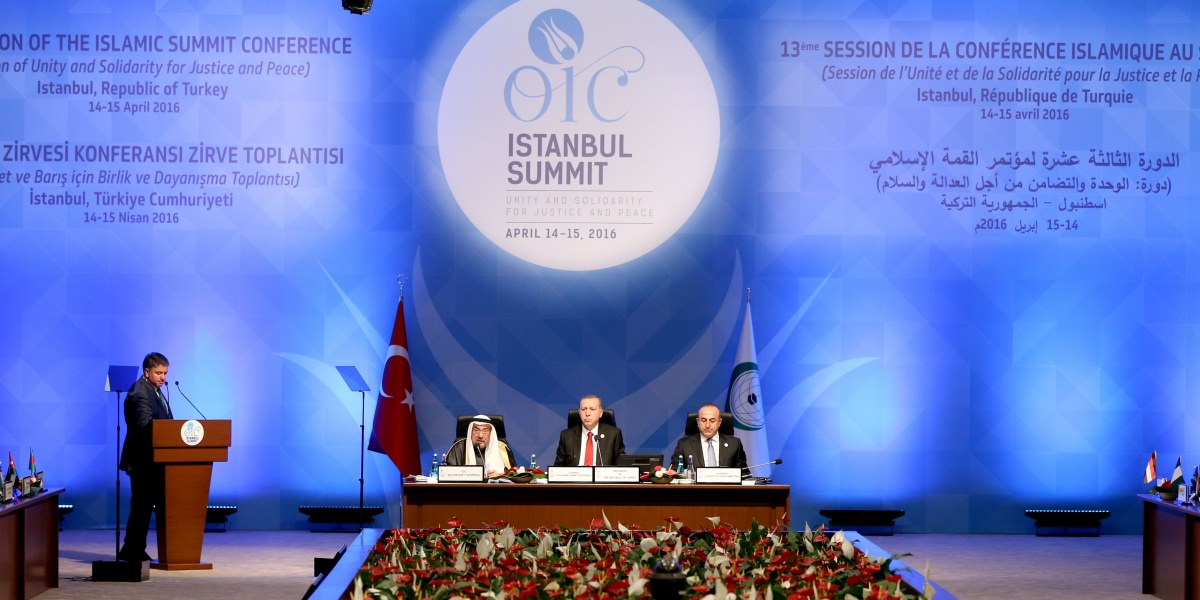
Is the Islamic World the Subject of Global Crises?
The ability of Islamic countries to come together and put forward a common vision in the face of regional and global problems, and for them to develop appropriate political solutions for this vision, is an important opportunity for global peace.
Share
The 13th session of the Organization for Islamic Cooperation's (OIC) Islamic Summit met in Istanbul hosted by President Recep Tayyip Erdoğan with the presence of OIC member country representatives. The conference was attended by 24 countries' presidents, nine heads of government, six speakers or vice presidents, 12 ministers, two undersecretaries and three ambassadors. The purpose of the meeting that gathers every three years is to analyze the influence of global developments and crises in the Islamic world and to generate solutions to the challenges faced in political, economic and social areas.
The summit met under the theme of "Unity and Solidarity for Justice and Peace" in an environment of rising fanaticism, amid which feelings of inequality and injustice are becoming globalized. Domestic and international terrorism, Islamophobia, xenophobia, refugees, tensions in the Middle East and the stress created by the Shiite-Sunni divide are outstanding issues of the modern Islamic world.
The previous Islamic Summit met Feb. 6-7, 2013 in Cairo. From that time until now, the harsh changes in the balances in the Middle East as a result of events there, the incapacity of the Arab Spring to meet expectations, the civil war in Syria quickly turning into a power struggle and Turkey becoming a more effective and important actor in the international and regional system all make the fact of Turkey hosting the summit even more important. With this conference, the OIC term presidency has transitioned to Turkey for two years.
Prior to the summit, Foreign Minister Mevlüt Çavuşoğlu, who headed the Foreign Ministers Council Meeting, also held many bilateral meetings with member country representatives. An agreement was reached through these meetings to form partnerships in social, economic, and cultural projects. Alongside the action plan formalized at the summit, 107 goals were determined, with18 of them to be prioritized, including peace, security, Palestine and Jerusalem, the fight against poverty, the struggle against terrorism and radicalism, investment and finance, science and technology, climate change and sustainability, inter-religious dialogue, joint Islamic humanitarian action, good governance and human rights. We must specify that from among these, terrorism, Islamophobia, sectarianism and the Palestine issue were at the forefront.
The Islamic world is unfortunately positioned due to terrorism, fanaticism, violence, divided states, poverty and other problems instead of for its level of social, economic, political and cultural capital. While the Islamic world is faced with the heavy costs of the problems it faces in the global system, it is also faced with the distress of not reaching the status it deserves in the global system. This psychology was reflected very clearly at the summit.
The ability of Islamic countries to come together and put forward a common vision in the face of regional and global problems, and for them to develop appropriate political solutions for this vision, is an important opportunity for global peace. It is necessary for Western leaders to wake up to this reality, not just Muslim country leaders. On the other hand, it is obvious that the aforementioned problems are not ones that OIC member countries can come together and fix by themselves. In other words, the Islamic world cannot be regarded as the sole subject of these problems and the sole source that can provide solutions to them. The perception that the Western global order is in crisis and that Western countries remain indifferent and act two-faced to the humanitarian crises in Islamic countries is on the rise among the leaders and people of Islamic countries. The rising feeling of injustice in the Islamic world is deepening global risk and threats.
In response to this, Western countries continue to securitize the Islamic world. It is necessary to surpass the paradigm of Sept. 11 and to leave aside the securitization policy on Islam and Muslim countries. Until the West acknowledges that Muslim countries are not the sources of global risks, but partner countries to the crises humanity is experiencing, it will continue to face these problems.
The securitization policy of Western states on Muslim regions unfortunately brings with it Islamophobia, xenophobia and the rise of the far-right in Europe and the U.S. The transformation of the policy of cultural revenge into a political tool, and this finding a response in mainstream political discourse and action, is one of the most important factors threatening world peace. The Islamic and Western worlds must find a common solution to the global system's problems.
[Daily Sabah, April 15, 2016]
Tags »
Related Articles






